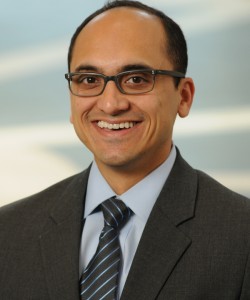Making a Difference
by Patty Gelb
 According to The American Cancer Society, approximately 13.7 million Americans were living with some form or history of cancer in 2012 and it is estimated that over 1.5 million new cancer cases will be diagnosed in 2014.
According to The American Cancer Society, approximately 13.7 million Americans were living with some form or history of cancer in 2012 and it is estimated that over 1.5 million new cancer cases will be diagnosed in 2014.
Treatment options can include chemotherapy, radiation therapy and even surgery. These treatments often produce side effects including nausea, pain and fatigue. The subsequent side effects can take over the patient’s daily life making them uncomfortable at best and miserable at worst.
One issue often not considered until too late are the financial effects that cancer treatment can have on individual and families. Fortunately, Dr. Yousuf Zafar (Med ‘02) is working on a project that could help alleviate some of the financial stress that can occur with the treatment of cancer.
Zafar is originally from Dayton, Ohio. After completing undergraduate work at the University of Chicago, he chose to go to The University of Toledo for medical school because he liked the school’s emphasis on learning about treating the whole patient and the focus on primary care. He also liked the fact that UT was close to home.
“So after exams and stressful times,” he said, “I found myself heading down I-75 for some home cooked food.”
After receiving his MD from UT, Zafar spent three years doing his internal medicine residency at the University of Cincinnati. He then did his hematology and oncology fellowship at Duke University in Durham, N.C. and has been on the faculty there ever since.
Zafar is a medical oncologist with a specialization in treating gastrointestinal cancers like colorectal, pancreatic and esophageal cancers, but his research is broader.
“My research focus,” said Zafar, “is specifically in improving the delivery of cancer care, with a focus within that on the cost of care. What I do on a day to day basis when it comes to my research is focus on how the cost of care impacts cancer patients and their lives.”
What he has found over the past few years is that cancer has become one of the most expensive diseases to treat in the United States because the drugs used are so expensive. His research has shown that even patients who have insurance are having a tough time making ends meet because of the out-of-pocket expenses of their care. His work is focused on how much patients are paying for care, how those costs are impacting the quality of care and how patients are changing their lives to help cope.
“Some patients are less likely to take chemotherapy because of cost,” Zafar shared. “And that may impact how well we can treat their cancer. We’ve also found that patients are spending less on food and groceries. They are spending their retirement savings all to help pay for their cancer bills.”
Medical professionals know that the treatment of cancer can cause physical toxicity from the side effects. But Zafar’s work, along with the work of others has shown that it can also cause what he referred to as “financial toxicity.”
“It can really impact a family,” he said. “The research that we’ve done to this point has been highlighting this problem. So what we are doing now is looking at ways to try and decrease the financial toxicity of cancer treatment. It’s fortunate that we have had a lot of interest in this topic because it impacts a lot of patients and a lot of people who know patients with cancer.”
Zafar is currently working on a very exciting project that will hopefully help with this problem of financial toxicity. He is in the process of developing an app at the Duke Cancer Center called FinANCE which stands for “Financial Assistance, Navigation and Communication Education.”
This app will be used by patients to help identify where they are having the biggest financial problems with their cancer treatment. It will help point them to the right resources to get help and financial assistance and coach them on ways to talk to their doctor about costs.
“One thing that we have found is patients are reluctant to bring up costs during a doctor’s appointment for many reasons,” said Zafar. “If we can help patients bridge that gap, to broach the topic of costs which they are often having problems with, hopefully we can prevent the problem in the first place.”
This app is in the early stages of development.
“We’ve partnered with a company that is based here in Durham that is also very interested in price transparency,” he said. “So patients know how much their treatment is going to cost.”
When discussing what ways costs can be deferred, Zafar shared that it is a complicated topic. In many cases there is not alternative treatment for cancer patients that may cost less.
“There might be a couple of examples here and there,” he said. “But for the most part, patients don’t have a great deal of alternatives in terms of treatment. However, what we’ve found is that is when patients talk to the doctor about costs, they actually see a decrease in their out of pocket costs because doctors can advocate for patients with the insurance company.”
Other potential cost savings include doctors referring patients to financial assistance programs with which the patients might not be familiar. Additionally, there are alternatives treatments, ways to change tests or simply test less frequently. All of these might lighten the financial burden.
It may be awhile before Zafar’s app is available for public use. As with any research it is a long term process. The first step is to make sure it works right. The second step is to make sure that patients are willing to use it. Then the third step is to see if it actually changes patient behavior and improves outcomes for patients.
“It is a multi-step process,” said Zafar. “But I am really excited about this idea and my hope is that it can make a difference in the day to day lives of patients with cancer.”
Zafar feels he learned important skills during his time at The University of Toledo that contribute to his success today.
“I think the most important part of my training at UT that stuck with me and remained an important part of my career was to put the patient first,” he said. “Whatever I do, whether it is in my clinical practice or in my research eventually comes back to the patient. I had a really wonderful experience there at UT and it really boiled down to the people. They were caring and compassionate. And while I learned a lot about the biology in medicine, I learned a great deal about the art of medicine and the importance of compassion.”






